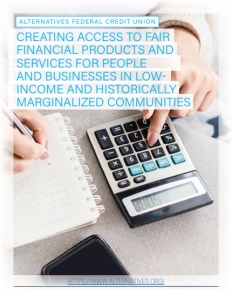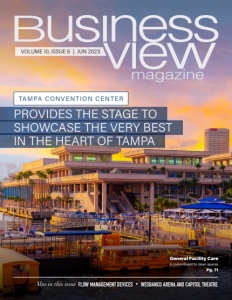Alternatives Federal Credit Union
creating access to fair financial products and services for people and businesses in low-income and and historically marginalized communities.
Working to address a long history of wealth inequality and economic racism, Alternatives Federal Credit Union steps up to make a financial difference for people in the communities they serve.
While banks may be in the news for the wrong reasons currently, there are some financial institutions that have made it their guiding principle to help find solutions for those that have been denied access to mainstream banking products and services.
Alternatives Federal Credit Union is one such example. Instead of using traditional guidelines for loan approval, like a credit score, “Alternatives focus on your ability to pay”, says Carol Clark, Financial Empowerment Manager. This means more people can get access to capital without being forced to use predatory high interest lenders. For those individuals that may not have access to banks at all, Alternatives is willing to go out in the community (and the local jail) to discuss their financial goals and needs, embracing them as valuable members of the community.
Alternatives Federal Credit Union was founded in Ithaca, New York in 1979 as an alternative to conventional banking. The focus would be on providing low-cost services to small businesses, low-income households, and non-profit organizations. The mission statement is to build and protect wealth for people with diverse identities who have been historically marginalized by the financial industry, especially those with low wealth or who identify as Black, indigenous, or people of color.
This grand vision was backed up by passionate, community-minded leadership, leading to quick growth. By 1990, there were almost 5,000 members at Alternatives, with deposits totaling over $12 million. In 2014, the Credit Union National Association (CUNA) awarded AFCU their 2014 Community Credit Union of the Year Award.
“The biggest thing that separates Alternatives from mainstream banking and even other credit unions is that we are a CDFI, a Certified Community Development Financial Institution,” explains Kevin Mietlicki, President and CEO. “And what that means is we’re much more purposeful about what we do and how we spend our money. We focus on what is going back into the communities that we do business in.”

There are only around 400 CDFI-certified credit unions in the entire country – that is out of some 5000 credit unions. Alternatives was the first to receive a CDFI Grant from the US Treasury in the 1990s and right from the beginning they stayed true to their name – an alternative to some of the dangerous and predatory lending practices that often target disadvantaged populations.
“We have also been designated as a low-income credit union,” Mietlicki adds, “which means over half of our membership has to be designated as low-income – 50% or less of the median income for the area. And that does describe us.”
A great example of the alternative way in which this institution approaches banking is found in its new Mortgage lending vehicle, The FAIR Mortgage (Finance Addressing Inequality and Racism) which has been completely redesigned from the ground up, line by line, to look at what is possible when it comes to lending money for home ownership.
“We spent a great deal of time doing research,” says Jerome Emanuel, Community Development Director for Alternatives, and one of the leads in developing this new mortgage product. “a great deal of time trying to understand the “why” behind what we were doing. One thing we realized is that throughout history there has been this practice of redlining, mfinaking it impossible for families in certain demographics to buy a house and build generational wealth. Some of those practices have become so much a part of the way money has been lent that we felt we had to go through the rules line by line to discover what might be possible. It turns out we do have some flexibility. So, for example, we have decided not to look at credit scores, but to base decisions on where people are at in the last six months of their lives.”
This program is available to people who have low-income and are looking to buy a house, or for those who are first-time, first-generation homebuyers. The rationale for this is to focus on building generational wealth and not exclude those who might not qualify as “low-income”.
“There has been movement even in some of the major banks, especially post George Floyd, towards a more relational model – and changing the way we view our clients,” explains Emanuel, “but we knew it was not enough, and we wanted to create something that was sort of revolutionary for the time that we are in right now. We have high rates of incarceration, for example, and if it were up to traditional jobs there would be even higher rates of recidivism, but we see folks becoming entrepreneurs to overcome that, and we needed to create a vehicle that would allow us to reach out to these small business owners and offer them the opportunity to purchase a home.”
“Then another highlight is that we did a ton of research, especially post-COVID on what it means if people lost their jobs due to shutdowns during the pandemic. If you require two years of steady employment to qualify for a loan – that is truly limiting a lot of people from applying.”
“The Credit Unions’ purpose is to help build generational wealth for people that have been left behind.” Says Joe Cummins, Community Inclusion Director.

“As a Community Development Financial Institution, our mission is to serve families with less than 80% of the area’s median income, so we need to go out and find them because they don’t know about financial services and products that are non-predatory. So, when I go into a community, generally, they don’t believe we’re going to help them. They’ve been burned by financial institutions too often. Often, I see people with up to 25% APR car loans and that’s just normal. So, I have to convince them that Alternatives can and is willing to help them. They’ve never had someone from a financial institution speak to them that way.”
One of the main problems that he often encounters is that many people identify completely with their credit scores. They have been told over and over that because they have a low credit score, they can’t get an affordable loan, which is often the case. There is a lot of education necessary to convince people that they may actually be eligible for a car loan, a home loan, or a debt consolidation loan because of the way Alternatives has redefined creditworthiness.
“People in the communities we serve are accustomed to these predatory loans,” Cummins goes on to explain, “and so people are wary of us. But what people are finding is that we can really help them. There was this one bus driver who was paying 24 percent on his car loan. We discovered he also had a personal loan at 38 percent. We were able to pay off the personal loan with his new auto loan at 7.25% APR. So, we ended up saving him $4600 in finance charges over the life of those two loans.” The bigger issue was that he had a business that was struggling partly because his income was going towards these predatory loans. He now has room to breathe.
To get that message out there though, Cummins has to show up everywhere, over and over and over again, every street fair and barber shop, every community gathering or meeting. It is about visibility, but it is also about being a real part of the community. Many people, even the credit union staff, have been there themselves and understand what the clientele are facing.
They truly want to make a difference. Over the past year or so Alternatives has doubled their lending in another nearby area, Elmira, NY that was hit hard by the Pandemic. 91% of those loans went to families making less than 80% of the area median income. They have been doing business there without a physical location, but the need is so great they will be opening their first branch there soon.
“Our top priority is to keep showing up,” concludes Mietlicki, “we need to be present in our communities because we need to build that trust back up. We are helping people to get out of the vicious cycle of debt that leaves them just paying interest and never getting ahead. And we are doing it to help people, and to help communities, and we know we are making a real difference.”
AT A GLANCE
Alternatives Federal Credit Union
WHAT: An alternative financial institution with a mission to help the underrepresented
WHERE: Ithaca, New York
WEBSITE: https://www.alternatives.org/
PREFERRED VENDORS
VISA – www.visa.com
Visa is known as a trusted network and world leader in digital payments, connecting cardholders, businesses, financial institutions and governments in more than 200 countries and territories worldwide. But that’s only part of the Visa story. We’re also a trusted partner to local banks and credit unions, employing the power of our brand, industry influence and collective voice to help spark positive change in the communities where we work and live. Our Community Accounts teams are located in eight regions across the country to help you stay competitive while also engaging in activities relevant to the needs of your local communities. We understand how crucial community financial institutions are to their communities and we are committed to your success. Learn about how we can help you and your community thrive at visa.com/communityissuers




